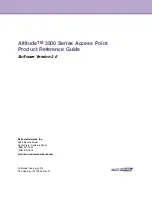
Altitude 3500 Series Access Point Product Reference Guide
13
C H A P T E R
1
Introduction
This
Altitude 35xx Access Point Product Reference Guide
contains setup and advanced configuration
instructions for both the Altitude 3510 and Altitude 3550 model access points. Both the Altitude 3510
and Altitude 3550 model access points share the same Web UI, CLI and MIB interfaces. There are no
differences in how the devices are configured using the instructions within this guide, even though the
Web UI displays Altitude 3510 or Altitude 3550 specifically.
NOTE
Check for the latest versions of documentation on the Extreme Networks documentation website at:
http://
www.extremenetworks.com/go/documentation
.
However, there are several differences between the two models you should be aware of. The Altitude
3550 is constructed to support outdoor installations, while the Altitude 3510 model is constructed
primarily for indoor deployments. The Altitude 3510 and Altitude 3550 are available in only a dual-
radio SKU—except the Israel SKU which has a single radio. An Altitude 3550 cannot use the Altitude
3510’s 48 volt power supply and, therefore, is recommended to use the Altitude 3550 Power Tap
designed specifically for outdoor deployments. An Altitude 3550 model access point also must use an
RJ-45 to Serial cable to establish a serial connection to a host computer.
The
access point
(AP) provides a bridge between Ethernet wired LANs or WANs and wireless networks.
It provides connectivity between Ethernet wired networks and radio-equipped mobile units (MUs).
MUs include the full line of terminals, adapters (PC cards, Compact Flash cards and PCI adapters) and
other devices.
The access point provides a maximum 54Mbps data transfer rate via each radio. It monitors Ethernet
traffic and forwards appropriate Ethernet messages to MUs over the network. It also monitors MU
radio traffic and forwards MU packets to the Ethernet LAN.
If you are new to using an access point for managing your network, refer to
“Theory of Operations” on
page 28
for an overview on wireless networking fundamentals.
Summary of Contents for Altitude 3500 Series
Page 10: ...Altitude 3500 Series Access Point Product Reference Guide 10...
Page 34: ...Introduction Altitude 3500 Series Access Point Product Reference Guide 34...
Page 66: ...Getting Started Altitude 3500 Series Access Point Product Reference Guide 66...
Page 112: ...System Configuration Altitude 3500 Series Access Point Product Reference Guide 112...
Page 168: ...Network Management Altitude 3500 Series Access Point Product Reference Guide 168...
Page 258: ...Monitoring Statistics Altitude 3500 Series Access Point Product Reference Guide 258...
Page 537: ...Altitude 3500 Series Access Point Product Reference Guide 537 3 Define a mesh supported WLAN...
Page 570: ...Adaptive AP Altitude 3500 Series Access Point Product Reference Guide 570...
Page 592: ...Altitude 3500 Series Access Point Product Reference Guide 592...
Page 594: ...Altitude 3500 Series Access Point Product Reference Guide 594...




























